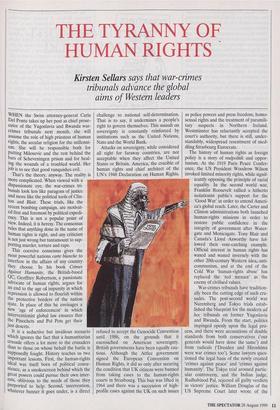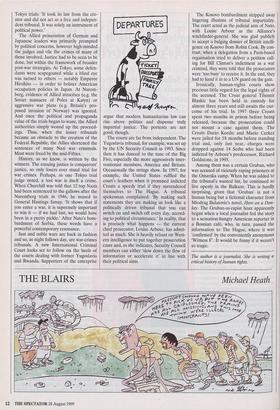THE TYRANNY OF HUMAN RIGHTS
Kirsten Sellars says that war-crimes
tribunals advance the global aims of Western leaders
WHEN the Swiss attorney-general Carla Del Ponte takes up her post as chief prose- cutor of the Yugoslavia and Rwanda war- crimes tribunals next month, she will assume the role of high priestess of human rights, the secular religion for the millenni- um. She will be responsible both for putting Milosevic and the rest behind the bars of Scheveningen prison and for heal- ing the wounds of a troubled world. Her job is to see that good vanquishes evil. That's the theory, anyway. The reality is more complicated. When viewed with a dispassionate eye, the war-crimes tri- bunals look less like paragons of justice and more like the political tools of Clin- ton and Blair. These trials, like the recent bombing campaign, are motivat- ed first and foremost by political expedi- ency. This is not a popular point of view. Indeed, it is heresy. The consensus rules that anything done in the name of human rights is right, and any criticism is not just wrong but tantamount to sup- porting murder, torture and rape.
This coercive consensus gives the most powerful nations carte blanche to interfere in the affairs of any country they choose. In his book Crimes Against Humanity, the British-based QC, Geoffrey Robertson, a passionate advocate of human rights, argues for an end to the age o impunity in which repression is allowed to flourish within the protective borders of the nation state. In place of this he envisages a n. ew 'age of enforcement' in which Interventionist global law ensures that the Pinochets and Pol Pots get their just deserts.
It is a seductive but invidious scenario which ignores the fact that a humanitarian crusade offers a lot more to the crusaders than to those on whose behalf the battle is supposedly fought. History teaches us two important lessons. First, the human-rights ideal was itself born of political conve- nience, as a smokescreen behind which the great powers could pursue their own inter- ests, oblivious to the needs of those they Purported to help. Second, intervention, whatever banner it goes under, is a direct challenge to national self-determination. That is to say, it undermines a people's right to govern themselves. This assault on sovereignty is constantly reinforced by institutions such as the United Nations, Nato and the World Bank.
Attacks on sovereignty, while considered all right for faraway countries, are not acceptable when they affect the United States or Britain. America, the crucible of human rights and chief architect of the UN's 1948 Declaration on Human Rights, refused to accept the Genocide Convention until 1986, on the grounds that it encroached on American sovereignty. British governments have been equally cau- tious. Although the Attlee government signed the European Convention on Human Rights, it did so only after securing the condition that UK citizens were banned from taking cases to the human-rights courts in Strasbourg. This ban was lifted in 1964 and there was a succession of high- profile cases against the UK on such issues as police powers and press freedom, homo- sexual rights and the treatment of paramili- tary suspects in Northern Ireland. Westminster has reluctantly accepted the court's authority, but there is still, under- standably, widespread resentment of med- dling Strasbourg Eurocrats.
The history of human rights as foreign policy is a story of realpolitik and oppor- tunism. At the 1919 Paris Peace Confer- ence, the US President Woodrow Wilson invoked limited minority rights, while signif- icantly opposing the principle of racial equality. In the second world war, Franklin Roosevelt rallied a hitherto isolationist public's support for the `Good War' in order to extend Ameri- ca's global reach. Later, the Carter and Clinton administrations both launched human-rights missions in order to restore public confidence in the integrity of government after Water- gate and Monicagate. Tony Blair and Canada's Lloyd Axworthy have fol- lowed their vote-catching example. Official interest in human rights has waxed and waned inversely with the other 20th-century Western idea, anti- communism, and at the end of the Cold War 'human-rights abuse' has replaced the 'red menace' as the enemy of civilised values.
War-crimes tribunals have tradition- ally been the cutting edge of such cru- sades. The post-second world war Nuremberg and Tokyo trials estab- lished the blueprint for the modern ad hoc tribunals on former Yugoslavia and Rwanda. From the start, politics impinged openly upon the legal pro- cess, and there were accusations of double standards from both conservatives (`our generals would have done the same') and from radicals (`Dresden and Hiroshima were war crimes too'). Some lawyers ques- tioned the legal basis of the newly created `crimes against peace' and 'crimes against humanity'. The Tokyo trial aroused partic- ular controversy, and the Indian judge, Radhabinod Pal, rejected all guilty verdicts as victors' justice. William Douglas of the US Supreme Court later wrote of the Tokyo trials: 'It took its law from the cre- ator and did not act as a free and indepen- dent tribunal. It was solely an instrument of political power.'
The Allied prosecution of German and Japanese leaders was primarily prompted by political concerns, however high-minded the judges and vile the crimes of many of those involved. Justice had to be seen to be done, but within the framework of broader post-war strategies. At Tokyo, some defen- dants were scapegoated while a blind eye was turned to others — notably Emperor Hirohito — in order to bolster American occupation policies in Japan. At Nurem- berg, evidence of Allied atrocities (e.g. the Soviet massacre of Poles at Katyn) or aggressive war plans (e.g. Britain's pro- posed invasion of Norway) was ignored. And once the political and propaganda value of the trials began to wane, the Allied authorities simply wound up the proceed- ings. Thus, when the lesser tribunals became an obstacle to the creation of the Federal Republic, the Allies shortened the sentences of many Nazi war criminals. Most were freed by the mid-Fifties.
History, as we know, is written by the winners. The ensuing justice is conquerors' justice, so only losers ever stand trial for war crimes. Perhaps, as one Tokyo trial judge noted, a lost war is itself a crime. When Churchill was told that 12 top Nazis had been sentenced to the gallows after the Nuremberg trials in 1946, he mused to General Hastings Ismay, 'It shows that if you enter a war, it is supremely important to win it — if we had lost, we would have been in a pretty pickle.' After Nato's bom- bardment of Serbia, these words have a powerful contemporary resonance.
Just and noble wars are back in fashion and so, as night follows day, are war-crimes tribunals. A new International Criminal Court looks set to follow on the heels of the courts dealing with former Yugoslavia and Rwanda. Supporters of the enterprise argue that modern humanitarian law can rise above politics and dispense truly impartial justice. The portents are not good, though.
The courts are far from independent. The Yugoslavia tribunal, for example, was set up by the UN Security Council in 1993. Since then it has danced to the tune of the Big Five, especially the more aggressively inter- ventionist members, America and Britain. Occasionally the strings show. In 1997, for example, the United States ruffled the court's feathers when it promised indicted Croats a speedy trial if they surrendered themselves to The Hague. A tribunal spokesman complained: 'By making such statements they are making us look like a politically driven tribunal that you can switch on and switch off every day, accord- ing to political circumstance.' In reality, that is precisely what happens — the current chief prosecutor, Louise Arbour, has admit- ted as much. She is heavily reliant on West- ern intelligence to put together prosecution cases and, as she indicates, Security Council members can either 'slow down the flow of information or accelerate it' in line with their political aims. The Kosovo bombardment stripped away lingering illusions of tribunal impartiality. The court acted as the judicial arm of Nato, with Louise Arbour as the Alliance's witchfinder-general. She was glad publicly to accept a bulging dossier of British intelli- gence on Kosovo from Robin Cook. By con- trast, when a delegation from a Paris-based organisation tried to deliver a petition call- ing for Bill Clinton's indictment as a war criminal, they were told that the prosecutors were 'too busy' to receive it. In the end, they had to hand it in to a UN guard on the gate.
Ironically, human-rights courts show precious little regard for the legal rights of the accused. The Croat general Tihomir Blaskic has been held in custody for almost three years and still awaits the out- come of his trial. In 1997 three Croats spent two months in prison before being released, because the prosecution could not mount a case against them. The Croats Dario Kordic and Mario Cerkez were jailed for 18 months before standing trial and, only last year, charges were dropped against 14 Serbs who had been indicted by Arbour's predecessor, Richard Goldstone, in 1995, Among them was a certain Gruban, who was accused of viciously raping prisoners at the Omarska camp. When he was added to the tribunal's wanted list, he continued to live openly in the Balkans. This is hardly surprising, given that `Gruban' is not a human being but a fictional character from Miodrag Bulatovic's novel, Hero on a Don- key. The Gruban-as-rapist hoax apparently began when a local journalist fed the story to a sensation-hungry American reporter in a Bosnian cafe, who, in turn, passed the information to The Hague, where it was `confirmed' by the conveniently anonymous `Witness F'. It would be funny if it weren't so tragic.
The author is a journalist. She is writing a critical history of human rights.



























































 Previous page
Previous page